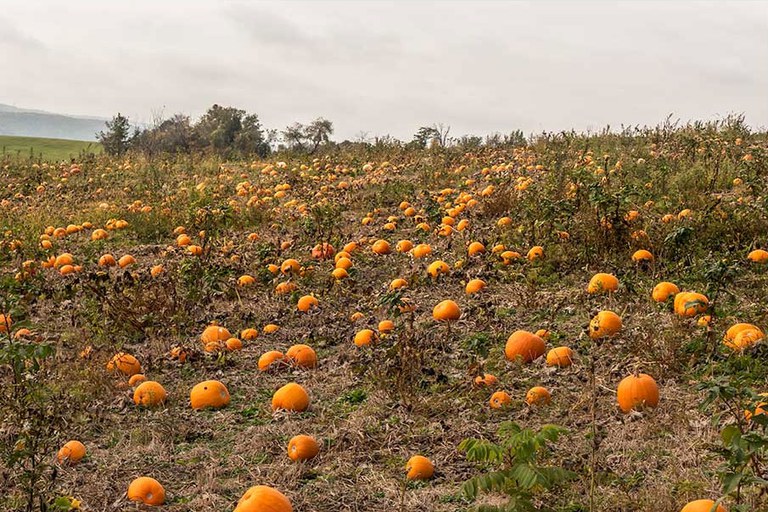Posted: March 2, 2017
Over the past four years, Project ICP has partnered with specialty crop growers across the country to carry out on-farm research on the pollination and yield of fruit, nut, and vegetable crops. Many of these growers, including Brian Campbell of Brian Campbell Farms in central Pennsylvania, are going beyond the scope of Project ICP’s research to test and implement innovative practices to improve crop pollination – and their bottom line.
Brian Campbell began farming at a young age; at age 14, he started a popular produce stand selling sweet corn and vegetables in Berwick, PA. After attending college at Penn State University, he returned home, rented 200 neighboring acres, and began farming and marketing vegetables. Since then, his farm has expanded to a 2,000-acre diversified operation growing pumpkins, sweet corn, broccoli, and other vegetables. His 400 acres of pumpkins are sold in Wal-Marts across the northeastern US.
"I love what I do," says Brian. "I wrestled in college, and farming comes with that same never quit attitude."
Five years ago, Brian began working with Penn State University researchers interested in native bee populations in central Pennsylvania. Students in the lab of Dr. Shelby Fleischer, a research partner on Project ICP, captured bumblebees in several of Brian's fields and analyzed the DNA of captured specimens to determine how many colonies were present in the area.
"I didn't know much about bees when they started collecting bees here," Brian explains, "but I wanted to learn more about the life cycle of different native pollinators and how that impacts everything." He began to pay more attention to the bees he was seeing in his fields and the surrounding natural areas, and how the practices he was using in his fields might affect those pollinators. "Some bees are ground-nesting, so we may have a pumpkin field where they're nesting and overwintering. The disking I do for crop management might be hurting those bees. That led me to look at other practices I can use to support native pollinators."
As Brian began to pay more attention to the pollinators in his fields, he realized that he had strong native bee populations in fields surrounded by good habitat. At the time, he was bringing in one hive of managed honey bees per acre for pumpkin pollination, the standard stocking rate. "Since I became more aware of the native pollinators, I cut back my honey bee rentals to ½ hive per acre," Brian says. "At $135/hive, that is a substantial cost savings." He says the relationships he had with the Penn State researchers and his beekeeper allowed him to feel comfortable cutting back on hives in all fields except those where he sees low bee activity in early spring. Four years later, he has no regrets.
In addition to cutting back on managed hives, Brian is now testing and implementing a variety of practices to support his native bee populations, including switching to no-till management for his pumpkin fields, planting floral provisioning strips on field edges, allowing flowering cover crops to bloom before termination, and cutting back on insecticide use. "We've really changed a lot of our spraying so that we're not spraying when bees are active," says Brian. "Turns out you can wipe out a lot of native pollinators if you spray them in the field." Researchers on Project ICP are monitoring the early spring and late summer flowering cover crop strips to see whether they benefit wild bumble bee populations and pumpkin pollination in Brian's fields.
Brian continues to enjoy learning more and testing new practices to improve his crop pollination and yields, despite the constant demands of farming 2,000 diversified acres. "You get into the season and there's so much to do," he says, "but there's also still so much to learn about pollination and pollinators."
By Emily May
This article first appeared in the Project Integrated Crop Pollination newsletter
Citation:
Emily May
Pollinator Conservation Specialist, Project Integrated Crop Pollination
The Xerces Society for Invertebrate Conservation


